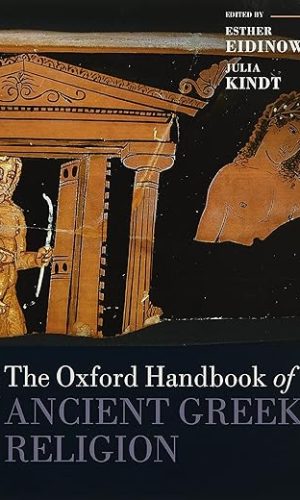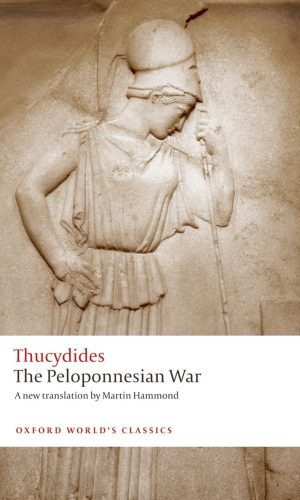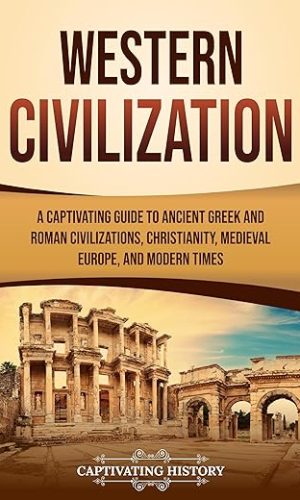Greece
-
Ionian Vision: Greece in Asia Minor, 1919-22
Michael Llewellyn-Smith sets the Greek occupation of Smyrna and the war in Anatolia against the background of Greece’s ‘Great Idea’ and of great power rivalries in the Near East. He traces the origins of the Greek statesman Eleftherios Venizelos’s ‘Ionian Vision’ to his joint conception with David Lloyd George of an Anglo-Greek entente in the Eastern Mediterranean. This narrative text presents a comprehensive account of the disaster which has shaped the politics and society of modern Greece.Read more
£12.30 -
Landmark Thucydides
Thucydides called his account of two decades of war between Athens and Sparta “a possession for all time,” and indeed it is the first and still the most famous work in the Western historical tradition.Considered essential reading for generals, statesmen, and liberally educated citizens for more than 2,000 years, The Peloponnesian War is a mine of military, moral, political, and philosophical wisdom.
However, this classic book has long presented obstacles to the uninitiated reader. Written centuries before the rise of modern historiography, Thucydides’ narrative is not continuous or linear. His authoritative chronicle of what he considered the greatest war of all time is rigorous and meticulous, yet omits the many aids to comprehension modern readers take for granted—such as brief biographies of the story’s main characters, maps and other visual enhancements, and background on the military, cultural, and political traditions of ancient Greece.
Robert Strassler’s new edition amends these omissions, and not only provides a new coherence to the narrative overall but effectively reconstructs the lost cultural context that Thucydides shared with his original audience. Based on the venerable Richard Crawley translation, updated and revised for modern readers, The Landmark Thucydides includes a vast array of superbly designed and presented maps, brief informative appendices by outstanding classical scholars on subjects of special relevance to the text, explanatory marginal notes on each page, an index of unprecedented subtlety and depth, and numerous other useful features. Readers will find that with this edition they can dip into the text at any point and be immediately oriented with regard to the geography, season, date, and stage of the conflict.
In any list of the Great Books of Western Civilization, The Peloponnesian War stands near the top. This handsome, elegant, and authoritative new edition will ensure that its greatness is appreciated by future generations.
Read more
£26.30£33.30Landmark Thucydides
£26.30£33.30 -
Religion and the Greeks (Classical World)
No area of Greek life was wholly untouched by religion, and a basic knowledge of this aspect of life is essential to anyone seeking a proper understanding of the classical world. In this engaging survey Robert Garland brings out the unique quality of Greek religion – its practical and worldly approach to man’s relationship with the divine – and shows how religious ritual was integral to the daily routine of both public and private life.Read more
£16.10 -
The Oxford Handbook of Ancient Greek Religion (Oxford Handbooks)
This handbook offers both students and teachers of ancient Greek religion a comprehensive overview of the current state of scholarship in the subject, from the Archaic to the Hellenistic periods. It not only presents key information, but also explores the ways in which such information is gathered and the different approaches that have shaped the area. In doing so, the volume provides a crucial research and orientation tool for students of the ancient world, and also makes a vital contribution to the key debates surrounding the conceptualization of ancient Greek religion.The handbook’s initial chapters lay out the key dimensions of ancient Greek religion, approaches to evidence, and the representations of myths. The following chapters discuss the continuities and differences between religious practices in different cultures, including Egypt, the Near East, the Black Sea, and Bactria and India. The range of contributions emphasizes the diversity of relationships between mortals and the supernatural – in all their manifestations, across, between, and beyond ancient Greek cultures – and draws attention to religious activities as dynamic, highlighting how they changed over time, place, and context.
Read more
£28.50 -
The Peloponnesian War
The Peloponnesian War by Thucydides is a timeless classic that has shaped the way we understand the past and the present. It is one of the earliest surviving works of history and a key source of information about the Peloponnesian War, which lasted from 431 to 404 BC. Thucydides was an Athenian general who witnessed the war firsthand and meticulously documented the events as they unfolded. In his work, he offers a fascinating account of the war from both sides, including detailed descriptions of battles, speeches and strategy. He even goes beyond the war’s military aspects, examining its social, economic and political ramifications. Ultimately, The Peloponnesian War serves as an invaluable record of a pivotal event in ancient Greek history and a timeless lesson on the power of human ambition. It has been studied and admired by scholars and students of history for centuries, and its insights remain relevant to this day. This edition utilizes the 1874 translation by Welsh academic Richard Crawley (1840-1893).Thucydides (c. 460 BC–c. 395 BC) was an Athenian historian and general whose work, History of the Peloponnesian War, is widely considered one of the most influential works of history in the Western tradition. Thucydides recounts the conflict between Sparta and Athens in the 5th century BC, and his account is noted for its level of detail and unbiased depiction of the events. His writing style is characterized by a combination of narrative and analysis, which has made his work the subject of much scholarly debate. As a historian, Thucydides was the first to document the causes and effects of the Peloponnesian War. He was also the first to use speeches and documents to explain events in a narrative form. His work provides insight into the politics and culture of ancient Greece, as well as the origins of democracy and war. Thucydides also wrote a brief autobiography, which offers insight into his life and his motivations for writing the History of the Peloponnesian War. In addition to his writing, Thucydides was an active participant in the Peloponnesian War itself. He served as an Athenian general and was involved in the siege of Amphipolis. He was subsequently exiled from Athens for his role in the failed expedition. Thucydides also had a long and distinguished military career, serving in several campaigns and as an advisor to the Athenian government. The legacy of Thucydides has endured for centuries. His work is still widely read and studied, and his analysis of the Peloponnesian War is the basis of much of our understanding of the period. Thucydides is considered one of the most influential historians of all time, and his work is essential reading for those interested in the history of Greece and the ancient world.
Read more
£11.60The Peloponnesian War
£11.60 -
The Peloponnesian War (Oxford World’s Classics)
‘The greatest historian that ever lived’Such was Macaulay’s verdict on Thucydides (c.460-400 BC) and his history of the Peloponnesian War, the momentous struggle between Athens and Sparta as rival powers and political systems that lasted for twenty-seven years from 431 to 404 BC, involved virtually the whole of the Greek world, and ended in the fall of Athens. Thucydides himself was a participant in the war; to his history he brings an awesome intellect, brilliant narrative, and penetrating analysis of the nature of power, as it affects both states and individuals.
Of his own work Thucydides wrote: ‘I shall be content if [my history] is judged useful by those who will want to have a clear understanding of what happened – and, such is the human condition, will happen again … It was composed as a permanent legacy, not a showpiece for a single hearing.’ So it has proved. Of the prose writers of Greece and Rome Thucydides has had more lasting influence on western thought than all but Plato and Aristotle. This new edition combines a masterly translation with comprehensive supporting material.
ABOUT THE SERIES: For over 100 years Oxford World’s Classics has made available the widest range of literature from around the globe. Each affordable volume reflects Oxford’s commitment to scholarship, providing the most accurate text plus a wealth of other valuable features, including expert introductions by leading authorities, helpful notes to clarify the text, up-to-date bibliographies for further study, and much more.Read more
£10.40 -
Western Civilization: A Captivating Guide to Ancient Greek and Roman Civilizations, Christianity, Medieval Europe, and Modern Times
Did you know that Western civilization has influenced the lives of almost everyone alive today?What do you know about Western civilization? It might sound like a funny question to ask, but a lot of people don’t realize how much the West has impacted the world. The values of Western civilization have influenced laws, people’s sense of individuality, and even our morals.
This book will trace Western civilization back to its roots. In this epic quest, we head all the way back to Greece when Greek philosophers like Socrates and Plato pondered the very meaning of life. Explore the depths of knowledge that were probed by Greek schools of thought, such as the Stoics and the Cynics.
Was it better to stoically grin and bear the troubles of life as the Stoics advised, or was it better to simply shrug one’s shoulders and declare everything to be pointless, stupid, and absurd?
And in the middle of these philosophers’ quest, a missionary from Judea named Paul of Tarsus stepped in to spread the “good news” of the Gospels. Christianity and other schools of thought converged, and the Roman Empire helped to facilitate the spread of these ideas far and wide. Soon, the foundations for Western civilization had been firmly established.
These ideas would later undergo renaissances, reformations, and scientific revolutions, but the basic foundation has remained in place. Here, in this book, we explore all of the fascinating aspects of the great framework upon which our modern Western civilization rests.
In this book, you will learn the following:
- Greek philosophical and scientific discoveries
- The convergence of Greco-Roman and Christian beliefs
- How Western civilization transformed during the Middle Ages
- The Renaissance, the Reformation, and the Scientific Revolution
- The march toward modernism and how that impacted the globe
- And much more!
Scroll up and click the “add to cart” button to learn more about Western civilization!
Read more
£3.00







